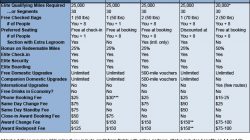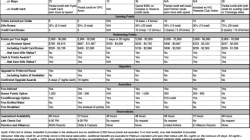This week I’m comparing the different elite status tiers at major U.S. airlines so you can consider which might suit your own needs as you begin planning travel for 2013. I laid out on Tuesday how, if a few mileage runs will be needed, you should try to get those out of the way at the beginning of the year rather than the end. Even if you won’t be doing any mileage runs, spending a few moments to think about where you’ll be going and how you’ll get there might help you realize that perhaps a different airline deserves your business.
I’ll mention a few things up front just to save space later on. Miles are generally divided into redeemable miles (RDM) that are exchanged for free travel or upgrades, as well as elite qualifying miles (EQM) that measure progress toward elite status. Both are earned for each trip, but usually RDM are earned more easily, especially for high-value fares, during promotional periods, or for those with elite status.
Some programs call their EQM by different names (Delta’s Medallion Qualifying Miles and United’s Premier Qualifying Miles come to mind) but I’ll stick with EQM for convenience. Second, many airlines allow you to earn status through segments instead of miles flown. This benefits those with lots of short trips, but it’s rare and often only business travelers will qualify. Finally, all of these programs require you to meet the thresholds within a calendar year between January 1 and December 31.
For this first post in the series, I’m only comparing basic low-level elite tiers. Many of these benefits can also be obtained from various co-branded credit cards. For example, almost all of these cards offer a free checked bag and priority check-in and boarding. However, actual elite status tends to be just one notch up. United requires you to pay for your ticket with a MileagePlus Explorer Visa if you want to get a free checked bag, but a Premier Silver can pay with any card. Boarding priority often puts credit card holders behind all elites but still before “the masses.”
I’m also not comparing every last benefit. A less-frequent traveler will not, in my opinion, be making the most use of same-day changes and fee waivers for award bookings. My coverage will obviously shift as we move to the higher echelons.
United Airlines – MileagePlus Premier Silver
Must accrue 25K EQM or 30 segments. In either case, at least 4 segments must be on United-operated flights.
- One (1) free checked bag for yourself and up to 8 companions on the same reservation.
- Access to priority check-in and security lines.
- Unlimited domestic upgrades (certain domestic routes, like EWR-HNL and JFK-SFO are excluded, but some international routes are also eligible).
- Unlimited upgrades for one companion.
- Minimum 500 RDM/EQM for every flown segment and 25% bonus on all RDM.
- Free Economy Plus seat assignments at check-in (24 hours before departure).
Scottrick’s Opinion: However you cut it, United’s benefits for its lowest elite tier are pretty shabby. The free bag check and priority check-in are available to credit card holders, though the priority security line access is new. Unlimited upgrades are nice, but you have to travel on less competitive routes and at less competitive times to even have a shot. (Priority is given to redeemed miles and vouchers, then elite status, then the fare class; even as a Premier 1K I often don’t clear if I have the lowest G fare). Good luck getting an upgrade for your companion, who will be processed after all other elites. My biggest reason for getting elite status many years ago was free Economy Plus, which provides tons of leg room, but now United doesn’t let its lowest tier choose one of these seats until check-in. You have to hope a higher elite got upgraded and even then only a middle seat may be left. Still, it’s good enough that I would choose a United-operated flight over most other airlines if you’re taking an interncontinental trip.
American Airlines – AAdvantage Gold
Must accrue 25K EQM, 30 segments, or 25K points.
Unlike some airlines that list qualification criteria as either miles or segments, American also uses a points system. It does not award bonus EQM for higher class fares (e.g., redeemable and first class fares). Instead you’ll earn bonus points, but deep-discount fares will also earn fewer points. So if you’re the kind of person who flies on high value fares you might earn status through points, but leisure travelers are more likely to earn through EQM.
- Two (2) free checked bags for up to 9 people on the same reservation.
- Access to priority check-in and security lines.
- Earn four (4) x 500-mile upgrades for every 10K EQM flown. One 500-mile upgrade must be redeemed for every 500 miles, or portion thereof, traveled by the flight you want to upgrade. Additional 500-mile upgrades can be purchased.
- Minimum 500 RDM/EQM earned for every flown segment and 25% bonus on all RDM.
- Free Preferred and Preferred Plus seat assignments at booking. Preferred Plus seats are only available to AAdvantage elite members.
- Certain elite privileges extend to travel on Alaska Airlines (but no upgrades).
Scottrick’s Opinion: American maintains very generous benefits across most of its elite tiers. For example, getting complimentary checked bags for nearly everyone in your itinerary has never been a benefit at this level with United. The major deficit is the limited number of upgrade opportunities. If you’re only traveling 25K miles per year, you’re unlikely to earn many of those 500-mile upgrade certificates. Upgrading a companion requires you to buy more or share the few you have. On the one hand, the ones you earn are more likely to successfully get you up front than a system based entirely on status. On the other hand, many low-level elites (including my younger self) have had decent upgrade success with programs like United’s when traveling at odd hours or on weekends with less competition from business travelers.
Delta Air Lines – SkyMiles Silver Medallion
Must accrue 25K EQM or 30 segments. EQM beyond the threshold rollover to the next year.
- One (1) free checked bag for yourself and one companion on the same reservation.
- Access to priority check-in, but NOT security lines.
- Unlimited domestic upgrades.
- Unlimited upgrades for one companion.
- 25% bonus on all RDM.
- Free Economy Comfort seats for domestic flights at check-in (24 hours before departure; see details).
- Certain elite privileges extend to travel on Alaska Airlines.
Scottrick’s Opinion: The rollover feature of Delta’s SkyMiles program is really the defining feature that may appeal to those who are making a choice and not just locked into a fortress hub like Atlanta. If you don’t want to deal with mileage runs, you may fly enough to get Silver status but not Gold. The leftover miles will rollover, making it easier to requalify and possibly reach a higher tier every other year. Many other benefits are more comparable to United than to American. Unlimited domestic upgrades are available to yourself and a companion, but you’ll be low in the hierarchy.
US Airways – Dividend Miles Silver Preferred
Must accrue 25K EQM or 30 segments.
- One (1) free checked bag for yourself and all companions on the same reservation.
- Access to priority check-in and security lines.
- Unlimited domestic upgrades.
- Unlimited upgrades for one companion.
- Minimum 500 RDM/EQM for every flown segment and 25% bonus on all RDM.
- Free preferred seat assignments, including the exit row.
Scottrick’s Opinion: US Airways is the underdog, and has been rightly criticized in the past for shoddy service. However, things are improving, and their loyalty program can be surprisingly generous and flexible given that you won’t face the same competition from a flood of elites on other airlines. I view it as comparable to American and United on the lower level and Delta on the upper level. In addition, US Airways is very willing to outright sell status. If you credit just one flight to Dividend Miles, you can buy the remaining EQM. (Up to 24,999 costs only $989. Pay less if you need fewer miles; the price is only slightly more than several good mileage runs.) If you want to just give it a try or fast-track your progress, pay $200 for trial Silver status and fly 7,500 EQM in 90 days to keep it.
Alaska Airlines – Mileage Plan MVP
Must accrue 20K EQM or 30 segments on Alaska-operated flights. 25K miles or 30 segments are required if including credit from partner-operated flights.
- Two (2) free checked bag for yourself and all companions on the same reservation.
- Access to priority check-in and security lines.
- Unlimited upgrades (but NOT for a companion).
- 50% bonus on all RDM.
- Free preferred seat assignments.
- Certain elite privileges extend to travel on American Airlines and Delta Air Lines (upgrades with Delta only).
Scottrick’s Opinion: Alaska has no alliance membership but lots of partners, making it a good place to credit you flights if you’re an irregular traveler who is unable or unwilling to pledge loyalty to a specific airline. It also has a relatively generous program, including the lowest qualification requirement (assuming you fly Alaska only) and some of the most generous benefits like more free checked bags and a higher RDM bonus. But… Alaska does not fly everywhere in the country, heads to few international destinations, and it can be relatively protective of its own members. My American Executive Platinum status meant nothing to them when my flight was cancelled earlier this year. If you are in the unfortunate position of living in Seattle and trying to fly American, most AA-marketed flights are actually operated by Alaska and reciprocal upgrade benefits won’t apply. Then again, if you live and travel almost exclusively on the West Coast, this is probably a fine program for you.
Summary
Of the major programs, your choice will have a lot to do with geography at the lowest tier because you probably will need to fly your preferred airline with every trip. Pick Alaska or United if you fly out of the Pacific Northwest, and United or American if you’re in California; some might still prefer Alaska even outside Washington. Moving further east you start heading into Delta territory, but United and American still have their outposts in Chicago and Texas. I always forget about US Airway’s hub in Phoenix. Eventually the East Coast becomes a free-for-all, with lots of busy airports and competing carriers, though Alaska’s presence dies off.
If you find you have a choice, determine which benefits you’ll use more often and whether a particular airline tends to offer fares competitive enough to be worth your loyalty. United has paltry benefits, and you may just want to get a credit card for the one or two flights you absolutely must take with them. American, Alaska, and US Airways are going to be most generous to the less-frequent traveler, but Delta may make it easier to maintain that status year after year.




